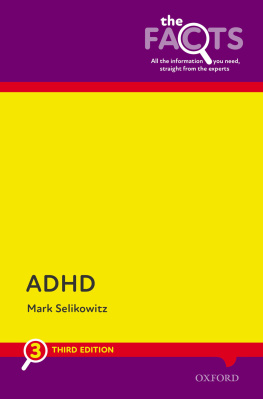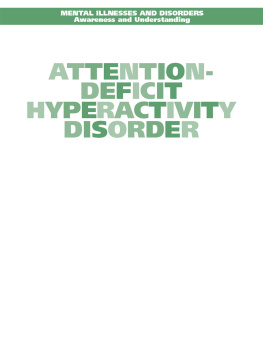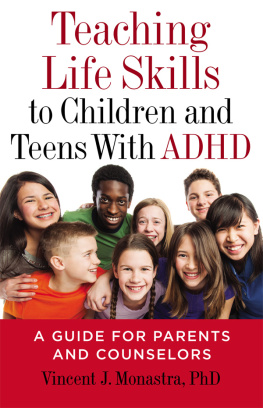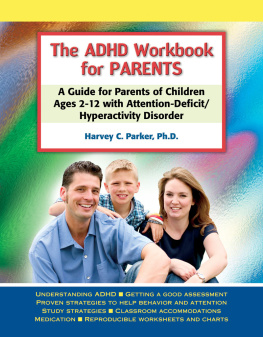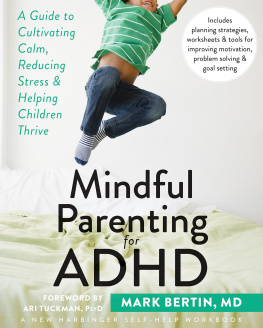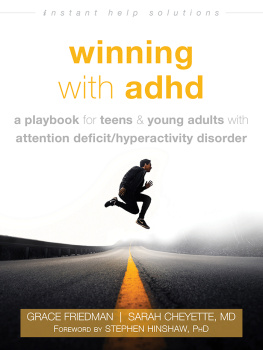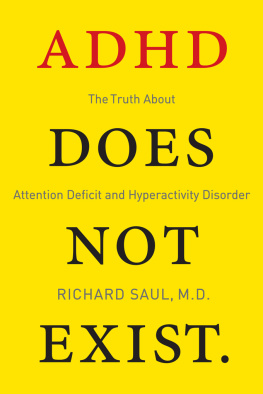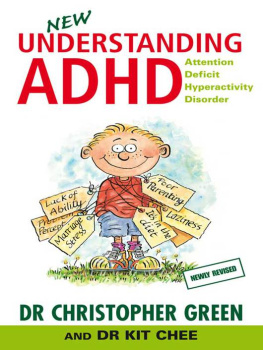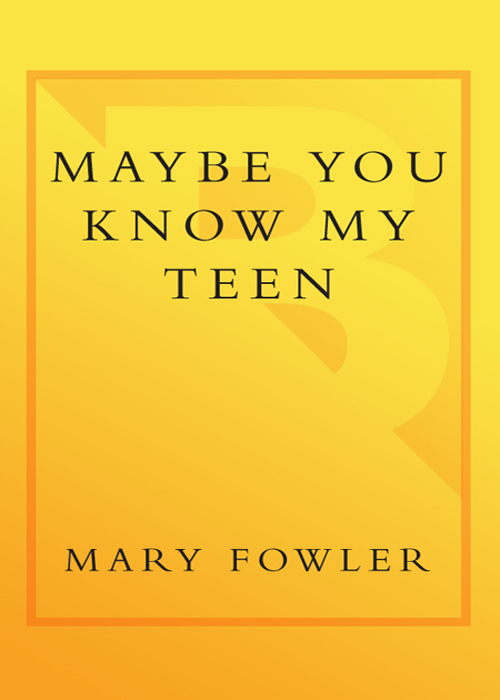
Acknowledgments
I am deeply appreciative to the many people who contributed to this book. Foremost, I thank the teens and parents who took me into their lives, tape recorder and all, so that I might capture their stories. They spoke openly, honestly, and with great courage. I would like to recognize each of these contributors personally, but we agreed that pseudonyms would be used in the book. Although I cant name each of you, please know that your contributions have been a great help to me and to those readers struggling for hope and answers.
I am also very grateful to researchers and professionals who generously shared their expertise and gave their time to me. Their commitment to their work greatly improves the lives of those with ADHD, their caregivers, and their loved ones.
My sincere thanks to:
Russell Barkley, Ph.D., director of psychology and professor of psychiatry and neurology at the University of Massachusetts Medical Center, director of the Center for Attention deficit Disorder.
Thomas Brown, Ph.D., associate director, Yale Clinic for Attention and Related Disorders, Yale University.
John Curry, Ph.D., associate professor and director of clinical training, department of psychology and social health sciences, Duke University Medical Center.
Margaret Feerick, Ph.D., Child Development and Behavior Branch, National Institute of Child Health and Human Development, National Institutes of Health.
Lisa Freund, Ph.D., program director, developmental psychobiology and neuroscience, Child Development and Behavior Branch, National Institute of Child Health and Human Development, National Institutes of Health.
Lili Frank Garfinkel, associate director, EDJJ: The National Center on Education, Disability, and Juvenile Justice.
Marsha Glines, Ph.D., dean of the College of Education and executive director of TAP, Lynn University.
Stephen Hinshaw, Ph.D., director of clinical training program, University of California, Berkeley.
Richard L. Horne, Ed.D., senior policy adviser, Presidential Task Force on Employment of Adults with Disabilities.
Peter Jensen, M.D., Ruane Professor for implementation of science and director of the Center for Advancement of Childrens Mental Health, Columbia University. Former associate director for child and adolescent research, National Institute of Mental Health.
David Keith, M.D., director of family therapy, interim director of child and adolescent psychiatry, SUNY Upstate, Syracuse University.
G. Reid Lyon, Ph.D., chief, Child Development and Behavior Branch, National Institute of Child Health and Human Development, National Institutes of Health.
Bruce McEwen, Ph.D., professor and head of the Harold and Margaret Milliken Hatch Laboratory of Neuroendocrinology, Rockefeller University.
Sheri M. Meisel, Ph.D., associate director, EDJJ: The National Center on Education, Disability, and Juvenile Justice.
Sallie Montgomery, Psy.D., senior clinician, Hazelden Center for Youth and Families.
The Honorable Gerald Rouse, immediate past president, National Council of Family and Juvenile Court Judges.
W. Michael Nelson III, Ph.D., chair, professor of psychology, Xavier University.
Arthur Robin, professor of psychiatry and behavioral neurosciences and pediatrics, Wayne State University School of Medicine, chief of psychology at Childrens Hospital of Michigan.
Joseph Sergeant, Ph.D., president of Eunythydis, the European Network for Hyperkinetic Disorder, professor, Klinische Neuropsychologie, Vrije University, Amsterdam.
Robert Silverstein, J.D., director, Center for the Study and Advancement of Disability Policy, and former Staff director and chief counsel for the subcommittee on disability policy of the U.S. Senate Committee on Labor and Human Relations.
I also thank the excellent clinicians who added a chairside perspective: clinical psychologists William Bumberry, Ph.D., St. Johns Mercy Medical Center, St. Louis, MO, Drew Yellen, Ph.D., Richard Zakreski, Ph.D, and Patricia Quinn, M.D., author and co-editor, ADDvance magazine.
My appreciation to Ross Greene, Ph.D., Katherine Kennedy, Ph.D., Barbara Posner, Helene Reynolds, Marsha Bartolf, and Eileen Vogel; Lt. Kristie Etue from the Michigan State Police Prevention Services Section and the staff of Sorensons Residential Treatment Center.
Many thanks to James Swanson, Ph.D., director of the Child Development Center, professor of pediatrics at University of California, Irvine; Thomas Spencer, M.D., Timothy Wilens, M.D., and Eric Mick, Sc.D., of Harvard University and Massachusetts General Hospital; Ann Masten, Ph.D., director of the Institute of Child Development, University of Minnesota; and William Pelham, Ph.D., SUNY Buffalo, for providing me with stacks of articles that provided much background and foreground for this book.
I am also grateful to the following publishers and organizations for graciously supplying me with books and access to information: The Resolving conflict Creatively Program, the National Center for Children and Youth with Disabilities, Guilford Publications, Brooks Cole Publishers, OReilly Press, and PIRI (Public Information Resources, Inc., www.edupro.com), sponsors of the nationally recognized annual Learning and the Brain Conference.
Special thanks to Richard Zakreski, Ph.D., for reviewing the text; Robert Silverstein, J.D., for his assistance with the special education law chapter; and attorneys Michaelene Laughlin and Pete Wright for fact checking the special education chapter; Heather Ringeisen, Ph.D., at NIMH; and William Cope Moyers, who graciously helped me with interview sources.
For the wonderful support, I thank my former students, and the Staff, administration, and school board of the Oceanport School District.
Much appreciation goes to my family, especially my mother, and to David and Mollie; to my friends, especially Sandy Thomas for her bottomless supply of moral support, care, and concern; and to Joyce Block, Cat Doty, Stevi Lischin, Helen Pike, and Bobbie Van Anda.
I also wish to thank all those involved in the publication of this book, including Hillel Black for encouraging me to write it, my agent Wendy Lipkind for her patience and wisdom, Tracy Behar for her initial interest in this work, editorial assistant James Benson for his considerable effort, my editor Tricia Medved for her commitment, care, and help in bringing this manuscript to form, and Rick Lavoie for writing the foreword.
Also by Mary Fowler
MAYBE YOU KNOW MY KID
A Parents Guide to Helping Your Child with Attention Deficit Hyperactivity Disorder
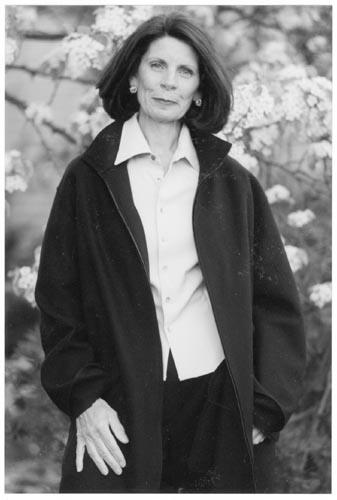
MARY FOWLER has more than twenty years of experience as the parent of a son who has ADHD. She is considered a leading lay authority on the disorder. As the former vice president of government affairs of CHADD, the national ADHD support group, Ms. Fowler was instrumental in leading the national advocacy movement, which led to the inclusion of ADHD in the Individuals with Disabilities Education Act (IDEA). She has testified before Congress, worked with numerous advocacy groups, and served as an ADHD consultant to many professional organizations, scientific committees, and universities. She has been on numerous television and radio talk shows, including Today and NPR. She lectures internationally on topics related to ADHD and is the author of the very successful Maybe You Know My Kid: A Parents Guide to Helping Your Child with Attention deficit Hyperactivity Disorder
Next page

